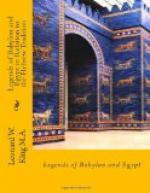“By the Soul of Heaven, by the soul of Earth, shall ye conjure him, That with you he may . . . ! Anu and Enlil by the Soul of Heaven, by the Soul of Earth, shall ye conjure, And with you will he . . . !
“The niggilma
of the ground springs forth in abundance(?)!”
Ziusudu, the king,
Before Anu and Enlil
bows himself down.
Life like (that of)
a god he gives to him,
An eternal soul like
(that of) a god he creates for him.
At that time Ziusudu,
the king,
The name of the niggilma
(named) “Preserver of the Seed of
Mankind”.
In a . . . land,(1)
the land(1) of Dilmun(?), they caused him to
dwell.
(1) Possibly to be translated “mountain”. The rendering of the proper name as that of Dilmun is very uncertain. For the probable identification of Dilmun with the island of Bahrein in the Persian Gulf, cf. Rawlinson, Journ. Roy. As. Soc., 1880, pp. 20 ff.; and see further, Meissner, Orient. Lit- Zeit., XX. No. 7, col. 201 ff.
The first two lines of the column are probably part of the speech of some deity, who urges the necessity of invoking or conjuring Anu and Enlil “by the Soul of Heaven, by the Soul of Earth”, in order to secure their support or approval. Now Anu and Enlil are the two great gods who had determined on mankind’s destruction, and whose wrath at his own escape from death Ziusudu must placate. It is an obvious inference that conjuring “by the Soul of Heaven” and “by the Soul of Earth” is either the method by which Ziusudu has already succeeded in appeasing their anger, or the means by which he is here enjoined to attain that end. Against the latter alternative it is to be noted that the god is addressing more than one person; and, further, at Ziusudu is evidently already pardoned, for, so far from following the deity’s advice, he immediately prostrates himself before Anu and Enlil and receives immortality. We may conjecture that at the close of the Fifth Column Ziusudu had already performed the invocation and thereby had appeased the divine wrath; and that the lines at the beginning of the Sixth Column point the moral of the story by enjoining on Ziusudu and his descendants, in other words on mankind, the advisability of employing this powerful incantation at their need. The speaker may perhaps have been one of Ziusudu’s divine helpers—the Sun-god to whom he had sacrificed, or Enki who had saved him from the Flood. But it seems to me more probable that the words are uttered by Anu and Enlil themselves.(1) For thereby they would be represented as giving their own sanction to the formula, and as guaranteeing its magical efficacy. That the incantation, as addressed to Anu and Enlil, would be appropriate is obvious, since each would be magically approached through his own sphere of control.
(1) One of them may have been the speaker on behalf of both.




